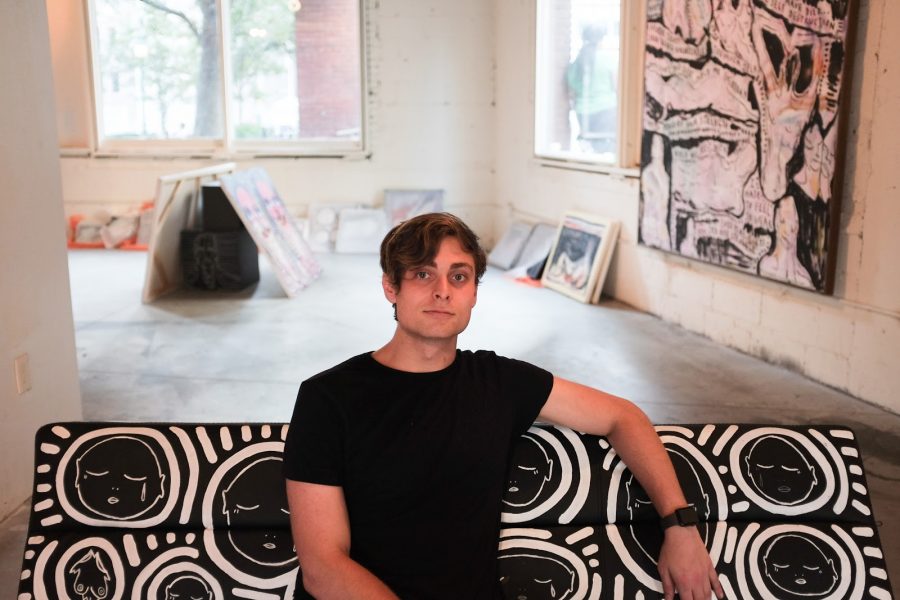It is a Friday afternoon in the Financial District. The sun beats down at 86 degrees even though the forecast promised a more mild afternoon. On Beekman Street, Tyler Cooperman (who goes by Ty) is getting ready for Patrick Church’s upcoming exhibition, “A Hell of My Own Making.” He is wearing shorts that look more like swim trunks, and as he greets me, he apologizes for the sweat. He later tells me he only wears elastic to work and taking a look around at the space, I soon understand why.
Although a handful of paintings have already been hung on the wall, the majority are stacked by the entrance and against the wall opposite to it. A playlist I can only hope to call latin techno bumps in the background. Church’s studio assistant is painting faces on the wall. There is little to no AC and vintage floor fans hum like cicadas. Passersby walking home from work rubberneck outside the large windows; some take pictures.
As a 24-year-old graduate student at Columbia University’s Teachers College, it’s hard to believe that Tyler Cooperman is largely in charge of this entire production. In fact, as Church’s artist representation, Cooperman isn’t just leading the charge for “A Hell of My Own Making,” but for all of Church’s art, whether it be hand-painted jackets that have been featured in Vogue or painting commissions for collectors. It would, however, be misleading to say that Cooperman was doing all of this by himself.
“It takes a village,” Cooperman says repeatedly throughout the interview.
Indeed, in the world of fine art, it often does. While people tend to imagine an artist selling their work directly to buyers, the reality is much less romantic. Between the artist and the buyer are many people like Cooperman: appraisers, curators, dealers, artist representatives — you name it. While these professionals don’t make the art, many would argue that they are an integral part of the fine art life cycle. In theory, they help artists make more money so that they can make more art and so on and so forth.
Sometimes though, these non-creative professionals can take advantage of their artists and make them dependent upon their representative’s connections and financial savvy. This is the exact thing Cooperman, one of the founders of the artist collective Haus of Anti, is trying to combat.
“Our mission statement is and has always been to help visual artists — and specifically queer visual artists — find financial viability in the contemporary art market. So I teach a lot of contract and financial literacy to artists,” Cooperman says.
Cooperman occupies a very niche area in business, and he knows that. In fact, he tells me how frustrating it was trying to find the perfect area of study during his first years in college at Claremont McKenna.
“I had like eight different majors. I was on the finance bro path when I was 18. I was an econ guy when I started college. I feel like I tried out what feels like 10 different careers and the process of that kind of sucks because you keep feeling like ‘why can’t I find something that satiates me financially, emotionally and physically,’” Cooperman says.
It wasn’t until Cooperman transferred to NYU that he felt he had the freedom and the art community he needed to find his path.
“None of this would be happening had I not been in NY at a school that was willing to teach me but [also] give me the freedom in terms of my time, I think allowing me to think of school as a full time job, and still have side projects and a life,” Cooperman says.
Cooperman doesn’t plan to leave New York anytime soon. As a fifth-generation New Yorker, he has both the connections and the can-do attitude that stop him from going anywhere else in the world. For Cooperman — who lives two blocks away from where his grandma grew up on the Lower East Side — New York is and will always be home, and he says transferring to NYU was a vital step in realizing that.
“I think the people who are new to New York forget this, but the way you accomplish the most things in this city is by being nice and by being competent, and as long as you are willing to do those things, you can really make magic.”
Patrick Church’s exhibition “A Hell of My Own Making” opens Thursday, Sept. 5 at 117 Beekman St., Financial District at 7 p.m. – 10 p.m.
A version of this article appears in the Tuesday, Sept. 3, 2019, print edition. Email Claire Fishman at [email protected].


























































































































































